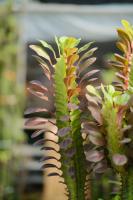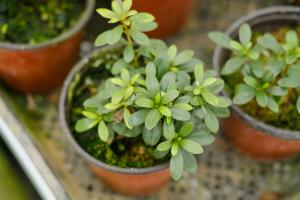Introduction
Chinese tea tree bonsai plants are a popular choice for indoor gardening enthusiasts. These miniature trees require the right balance of nutrients to thrive and develop properly, making it crucial to use the correct fertilizer. What NKP (nitrogen, phosphorus, and potassium) ratio should you use to keep your Chinese tea tree bonsai healthy and vibrant?
Why NPK Ratio Matters
The NPK ratio of fertilizer refers to the percentage of nitrogen, phosphorus, and potassium, respectively, contained in the product. Each element plays a critical role in plant growth and development.
Nitrogen, for example, is important for the production of chlorophyll, which is responsible for the green color of plants. Phosphorus helps to facilitate healthy root development and the growth of new tissue. Potassium is necessary for strong stems and overall plant resilience.
Choosing the correct NPK ratio for your Chinese tea tree bonsai plants will support healthy growth and ensure that it is receiving the nutrients necessary for optimal development.
The Ideal NPK Ratio for Chinese Tea Tree Bonsai Plants
The ideal NPK ratio for Chinese tea tree bonsai plants is 4:4:4 or 5:5:5. This ratio ensures that the plant receives a balanced amount of each nutrient, supporting healthy growth and rich foliage.
It is important to note that while the NPK ratio provides a helpful guideline, other factors including soil pH, temperature, and lighting can also impact plant growth. Regular testing and monitoring of soil nutrients and plant health is recommended to ensure optimal growth.
Choosing A Fertilizer
When choosing a fertilizer for your Chinese tea tree bonsai plant, look for products that have the appropriate NPK ratio. You can find these ratios listed on the packaging, typically in the form of three numbers separated by dashes. For example, a 5-5-5 fertilizer contains 5% nitrogen, 5% phosphorus, and 5% potassium.
Organic fertilizers are considered a safe and effective option for Chinese tea tree bonsai plants, as they do not contain harsh chemicals that can damage the plant over time. Bone meal and fish emulsion are popular organic fertilizers that can provide the necessary nutrients for healthy plant growth.
Application and Frequency of Fertilization
When applying fertilizer to your Chinese tea tree bonsai plant, it is important to follow the package instructions carefully. Over-fertilizing can lead to burn and stunted growth, while under-fertilizing can leave the plant lacking in essential nutrients.
Typically, it is recommended to fertilize Chinese tea tree bonsai plants once a month during the growing season, which typically runs from late winter through fall.
It is essential to monitor your plant regularly for signs of stress or nutrient deficiency, including yellowing leaves or slow growth. Adjust your fertilization routine as needed based on the plant's needs and growth patterns.
Conclusion
Choosing the right NKP ratio for your Chinese tea tree bonsai plant is essential for healthy growth and development. Look for fertilizers with ratios of 4:4:4 or 5:5:5, and consider organic options for safe and effective nutrient delivery. Regular monitoring and adjustment of fertilization routines can help ensure that your bonsai plant is receiving the necessary nutrients for optimal growth and health.

 how many times do yo...
how many times do yo... how many planted tre...
how many planted tre... how many pine trees ...
how many pine trees ... how many pecan trees...
how many pecan trees... how many plants comp...
how many plants comp... how many plants can ...
how many plants can ... how many plants and ...
how many plants and ... how many pepper plan...
how many pepper plan...






























